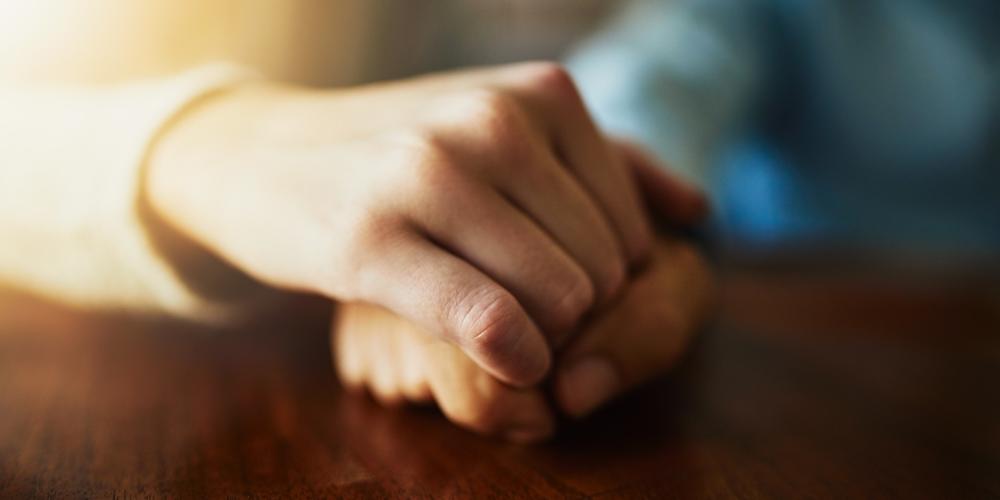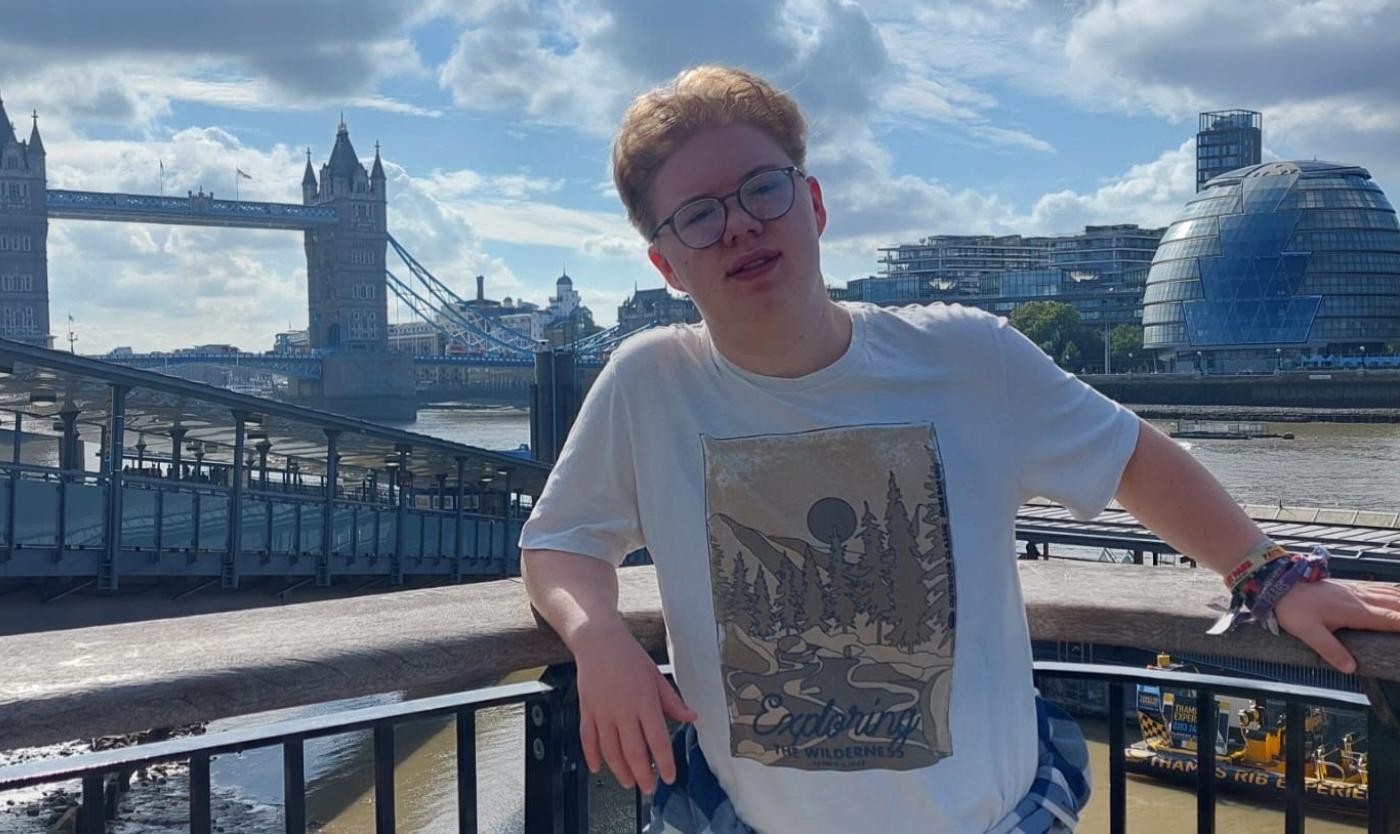
During Compassionate Week on 18 and 19 November, we reflect on caring: how can we be more alert to people going through a difficult time? And how can we better support and relieve the burden on those who do a lot of caring themselves? Maximiliaan Van Den Broeck is one such person. He is 19, a first-year Geography student, and a carer for his younger sister Marjolein. He shares what it’s like to care for a loved one while also trying to lead his own life. “When I’m at home, it’s hard to focus on my studies. But in my student accommodation, I can.”
Compassionate Week 2024
On 18 and 19 November, the VUB hosts Compassionate Week, focusing on empathy and care. These days invite us to reflect together on themes that affect us all: serious illness, grief, loss, and caregiving. Join inspiring workshops, write a comforting card, or drop by the welcoming "Compassionate Café." There will also be another Moment of Comfort, where we take time together to remember those we have lost. Whether you are experiencing loss yourself or simply wish to offer a listening ear, everyone is welcome.
Hello Maximiliaan. You’ve just started your studies. How have you found it so far?
“It’s quite nice, very interesting. There’s a lot of work, and it’s fairly stressful, but it’s manageable. I’m also a member of the Swamp student society.”
Alongside your studies, you also look after your sister. Can you tell us a bit more about her?
“My sister is nearly 17 and she has an ABI, an acquired brain injury. When she was 9, we were at a scouting camp together, and she contracted meningitis. She suffered lasting damage from it. She’s partially deaf and has a balance disorder. She also has chronic fatigue syndrome, which leaves her very tired, and she has a mild mental impairment. She goes to a special school because she couldn’t keep up in a mainstream one anymore.
At the moment, she’s in psychiatric care because things are mentally very tough for her too. Before she had meningitis, she was a very typical girl, and she’s well aware that she can no longer do many of the things she could before. Various tests have shown that her IQ is a bit below average, but her EQ is much lower. She has the social skills of a 17-year-old but not the emotional skills. When she’s at home, she acts more like a 9-year-old, which can be quite challenging. When she’s tired, it can lead to outbursts. Only my mum and I can calm her down when that happens.”
That sounds really challenging. Are there just the three of you in your household?
“Our grandmother also lives with us, but my sister is less receptive to her during difficult moments. Sometimes, even I’m only just allowed in, so to speak—she’ll say, ‘You’re not my mum.’ But usually, she’s a bit more open to me than to the rest of the world.”
And how is that for you?
“It has been tough. I find it hard to study when she’s struggling. I’m always thinking about how she’s doing. She’s been hospitalised several times for physical issues, as her immune system is very weak, and she’s also tried to take her own life a few times. I usually miss some school during those times, and it’s sometimes hard to find a balance. When I talk to other people about it, they tell me to focus on myself and not worry about it, but that’s easier said than done—she’s my little sister, after all.”
"we’ve always been close. Of course, we’d squabble sometimes, but we’ve always had a strong bond"
I can imagine. Did caring for her seem like an obvious thing for you to do?
“Yes, we’ve always been close. Of course, we used to argue sometimes, but our bond was always strong. I have autism myself, and she’s mindful of that. I do a bit more for her than she does for me, but we’re there for each other. It came naturally.”
That’s lovely. Do you feel there was enough room for you as a child in your family?
“Yes, my mum makes sure there’s enough space for both of us, and I need a bit less care now. But when I was younger, she was there for me and made sure I had someone to turn to if I needed it.”
Are you getting enough support from the VUB?
“Yes, definitely. As a ReFlex student, the main support for me is that I can miss a class if something happens with my sister, and most professors are fine with that.”
Are you able to focus on your studies and campus life?
“I find it easier now than last year, because I have student accommodation where I can set my sister’s situation aside for a while. That’s one of the reasons I wanted a place of my own. When I’m at home, I’m in the middle of it all, and that makes studying harder. But she’s currently in care, and that’s going reasonably well.”
And does she understand that you’re studying now and not abandoning her?
“Yes, absolutely. Last week, she wanted to invite a friend from her school over and texted me to ask if it was okay with me. She sends me loads of messages, so I think she misses me quite a lot, even if she’d never admit it.”

How do you see the coming months and years?
“I just want to keep studying at VUB, but my sister’s future is very uncertain. She’s in a very small course track for kids who are just below mainstream level but can still manage the material. It was initially said she could have a personalised track suited to her, but that’s not the case in practice. She’s the strongest in her class, which isn’t ideal for her. Next year, we might let her start in adult education.”
Is that something you’re tackling as a team within your family?
“Yes. We also don’t know how independent she’ll be able to be in the future. She has very good days where she acts like a 17-year-old, is independent, and quite clever. But then there are bad days, and we have to help her get dressed in the morning. It’s hard to know how that will evolve. One big problem with ABI is that there hasn’t been much research into it, and there aren’t many support tools.”
Do you receive any support from the Carers’ Support Centre?
“I don’t know all the help that’s available, but we have a cleaning helper and someone who oversees my sister’s school progress, as well as a psychologist who supports her. So we do get some help, but often those people don’t really know either.”
And are there moments when you can connect with others in similar situations?
“My mum knows some parents of kids with ABI, and I’ve also met siblings of kids with ABI. Those situations are often very similar; their futures are also very uncertain.”
And does it help to just talk about it with each other?
“Yes, it does. It’s hard enough for us to find other carers, and it’s also difficult for my sister to meet other kids with the same issues. Where she’s currently in care, she has already made friends. Let’s just say she prefers it there over school. So, I’m reasonably reassured for now.”
Is this something you mention to people here at VUB, like when you’re getting to know fellow students?
“I do tell them that I have a sister with a disability, but I don’t usually go into more detail. If they ask, I don’t mind talking about it.”
According to the Carers’ Support Centre, 1 in 5 children grow up with someone in their immediate surroundings who requires care. Does that surprise you?
“That’s a bit more than I expected, but on the other hand, it seems logical. I think roughly 1 in 5 people has a disability too.”
Do you think caring for someone since you were 12 will help you later in life?
“I’m often described as a very caring person, and I think that’s definitely because of it. One of the reasons I chose Geography is that it has a bit of sociology. I want to go into a field where I can help people, and that does stem from my situation.”
And are there also any pitfalls in that caring nature?
“Yes, I sometimes notice that. I do find it hard to say no when people ask for help. When I was worrying about my sister during exams, that was quite problematic. She was going through a very tough time before my June exams, and that affected how well I could study, especially since I was at home full-time then. But right now, things are going well, with her and with me.”*
Are you a student and also a carer? At VUB, you can apply for a ReFlex status. Find out more: VUB ReFlex Status
*This is a machine translation. We apologise for any inaccuracies.